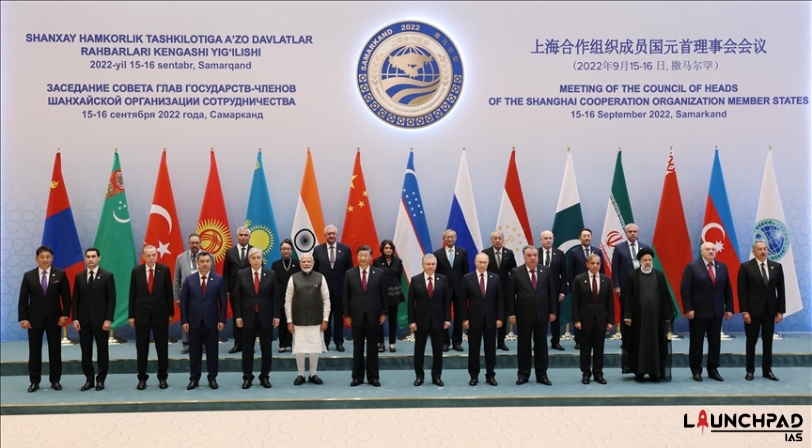What is the Shanghai Cooperation Organisation (SCO)?
- It is a Eurasian political, economic, international security, and defence organization established in 2001.
- Shanghai Cooperation Organisation encompasses approximately 60% of the Eurasian area and 40% of the global population.
- The combined GDP of its member states accounts for around 20% of the world’s GDP.
- Its main goals are to promote cooperation in politics, security, economics, and culture.
- It has a permanent secretariat in Beijing, China.
- Shanghai Cooperation Organisation has a number of affiliated organizations, including the SCO Regional Anti-Terrorist Structure (RATS) and the SCO Business Council.
Historical Background of Shanghai Cooperation Organisation
- It emerged as a successor to the Shanghai Five, which was established in 1996 by China, Kazakhstan, Kyrgyzstan, Russia, and Tajikistan.
- These countries, along with Uzbekistan, came together on 15 June 2001 in Shanghai to announce the formation of a new organization aimed at deepening political and economic cooperation.
- Over time, the organization expanded its membership to include eight states, with India and Pakistan joining on 9 June 2017.
- Iran officially became a member in 2023.
- The SCO is governed by the Heads of State Council (HSC), which serves as its highest decision-making body and convenes once a year.
Members of SCO
- Shanghai Cooperation Organisation has 9 members, including China, India, Iran, Kazakhstan, Kyrgyzstan, Pakistan, Russia, Uzbekistan, and Tajikistan.
What are the Ongoing Conflicts between Members of SCO?
- India and China have ongoing conflicts over border issues. Despite several rounds of talks, tensions have not eased.
- India and Pakistan face tension due to state-sponsored terrorism. Frequent ceasefire violations on the India-Pakistan border are also concerning.
- Kyrgyzstan and Tajikistan have border issues and pose a threat to regional stability.
- The border area between Taliban-led Afghanistan and Pakistan is unstable, leading to conflicts between the two countries.
Challenges Faced by Shanghai Cooperation Organisation as an Organization
The Shanghai Cooperation Organisation faces several challenges as an organization. Some of these challenges include:
- Power Imbalance: There is an inherent power imbalance within the organization, with China and Russia being the dominant players. This can lead to concerns about disproportionate influence and decision-making within the organization.
- Economic Integration: Achieving meaningful economic integration and equitable development within the organization poses a challenge.
- External Influences: It operates in a geopolitical landscape with competing interests from external powers. Balancing these external influences while maintaining unity and autonomy is a challenge for the organization.
- Democratic Principles and Human Rights: It includes countries with varying levels of commitment to democratic principles and human rights. Striking a balance between member states’ sovereignty and promoting human rights can be a complex task for the organization.
- Divergent Interests: It consists of member states with diverse interests, political systems, and priorities. This can make it difficult to reach a consensus on various issues, hindering the effectiveness of the organization.
- Terrorism and Extremism: Its region is susceptible to terrorism, separatism, and extremism. Coordinating efforts to combat these threats requires cooperation and intelligence sharing among member states, which can be complicated due to differing national security concerns.
Conclusion
- SCO provides a great opportunity for India to develop better economic and political ties with Eurasian countries. However there are a number of challenges faced by the organization.
- Addressing these challenges requires ongoing dialogue, trust-building, and effective cooperation among member states within the framework of the organization.
Importance of SCO for India:
- SCO is Part of India’s stated policy of pursuing “multi-alignments”.
- From the Indian perspective, the strategic and geographical space in which the SCO straddles is extremely important. The security, strategic, economic, and geopolitical interests are also closely intertwined with developments in this area
- The challenges of terrorism, radicalism, and instability pose a grave threat to Indian sovereignty and integrity
- India requested access to intelligence and information from SCO’s counter-terrorism body, the Tashkent-based Regional Anti-Terror Structure (RATS).
- A stable Afghanistan is in India’s interest, and RATS provides access to non-Pakistan-centred counter-terrorism information
- With the landlocked states of Central Asia, and Uzbekistan even doubly landlocked, accessing these resources becomes difficult. In this regard, India has prioritized the construction of the International North-South Transport Joining SCO, it will help India to connect with South Asian states.
- The Central Asian region is richly endowed with vital minerals and natural resources.
- The major interest is in energy cooperation. But India will also have to deal with an assertive China, which will push its Belt and Road Initiative.
- SCO membership will help India to be a major pan-Asian player, which is currently boxed in the South Asian Region.
Related Links: Belt and Road Initiative


